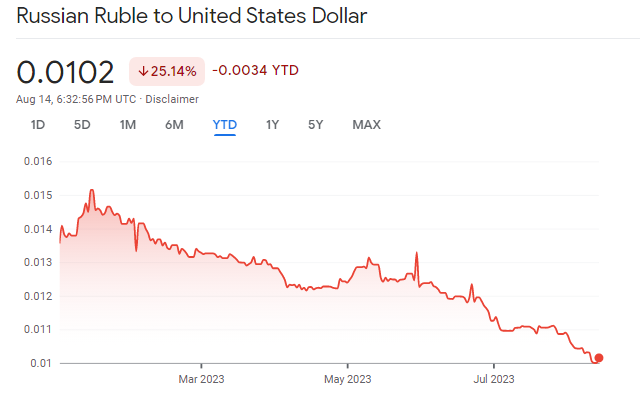
The Russian currency’s exchange rate versus the U.S. dollar recently dropped below RUB100 per greenback — its lowest in 16 months. Economists attribute the ruble’s latest plunge to the effectiveness of a price cap imposed on Russian oil by Western countries. Russ Mould said a strengthening U.S. dollar could be the reason why the Russian currency has struggled against the greenback in the past few months.
Impact of the Oil Price Cap
On Aug. 14, the Russian currency’s exchange rate versus the greenback dropped to a new low of just over 100 rubles for every dollar. The currency’s latest plunge means the ruble has now depreciated by over 8% in the past month and by more than 20% since the start of 2023.

The ruble’s woes, which appear to have worsened in the past few months, are in contrast to the currency’s fortunes in 2022 when it was the world’s best-performing currency for much of that year. As reported by Bitcoin.com News, the ruble’s performance at the time appeared to defy predictions that the currency would struggle in an isolated Russia.
Some experts have nevertheless linked the ruble’s latest woes to the price cap imposed on Russia’s oil by Western countries. The price cap seeks to stop Russia — a major oil exporter — from benefiting from rising oil prices. While the effectiveness of the price cap is still debatable, some economists including Robin Brooks have repeatedly urged the G7 countries to consider lowering the price cap.
Russian Ruble is falling (black), while the global Brent oil price (blue) is rising. This kind of decoupling is highly unusual and is the best piece of evidence that the G7 oil price cap is working. Putin isn't getting a windfall from rising oil prices like he did in 2022… pic.twitter.com/Rqmfm35WYb
— Robin Brooks (@RobinBrooksIIF) August 10, 2023
China Unwilling to Take Rubles
According to a BBC report, the ruble’s fall to its lowest rate versus the dollar in 16 months can be attributed to the sanctions imposed by Western countries on Russia after the latter invaded Ukraine. The report added that the move by countries like Germany to ditch Russian oil has also deprived Moscow of an important revenue source. Reduced export revenues have in turn restricted Russia’s ability to fund its budget.
Meanwhile, Russ Mould, an investment director at AJ Bell, is quoted in the report suggesting that China’s unwillingness to take rubles may be another reason why the Russian currency is losing ground.
“Exports are down, so hard currency inflows are down, and imports are up, and even reliable trading partners such as China appear reluctant to take rubles,” Mould said.
The investment director added that Russia’s removal from the Society for Worldwide Interbank Financial Telecommunications (SWIFT) could also be a factor that explains the currency’s slide. However, Mould also suggested that the ruble’s fall may be down to the U.S. dollar’s appreciation in the past few months.
What are your thoughts on this story? Let us know what you think in the comments section below.





